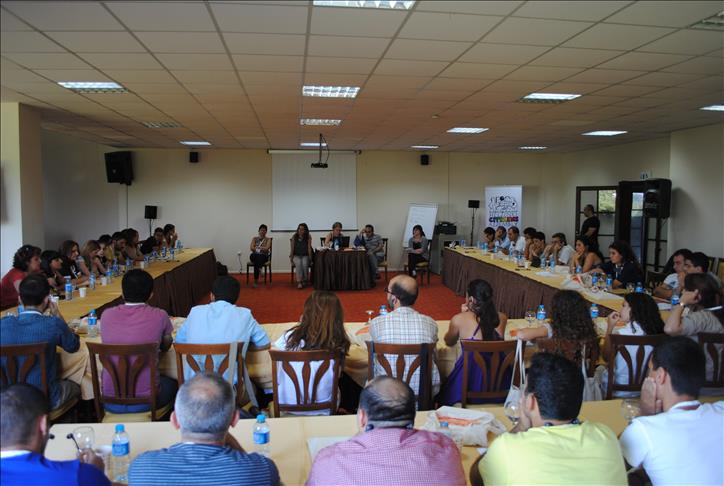
By Handan KAZANCI
KOCAELI, Turkey
Decades of mistrust and ignorance are slowly being broken down by a small group of Turkish and Armenian teachers who are organizing exchange events in Turkey.
A recent week-long summer school in Izmit, close to Istanbul, saw 40 educators and trainee teachers from Turkey and Armenia meet to exchange ideas – some participants encountering a Turk or Armenian for the first time in their lives.
The project was held in an attempt to support a peace process through dialogue between the two neighboring communities which share a divided and troubled past.
Relations between Ankara and Yerevan have been poor owing to bitter disagreements over events in 1915 which the Armenian diaspora and government describe as ‘genocide’, fuelling demands for compensation.
Turkey says that, although Armenians died during deportations in 1915, many Turks also died in attacks carried out by Armenian gangs in Anatolia.
In April this year, Turkey’s prime minister and president-elect Recep Tayyip Erdogan became the first Turkish statesman to offer condolences for the Armenian deaths.
For today’s Turks and Armenians working in the education project, reconciliation is a key concern. “I want peace,” says Aida Grigorian, a 19-year-old from Armenia’s northern city of Vanadzor, speaking during a break at the camp.
“I would like to have peace finally and to think that [although] something bad happened, now everything is ok,” says Grigorian, an English-language trainee teacher whose grandparents came from Turkey’s northeast province of Kars.
Organized by Istanbul-based human rights watchdog the Helsinki Citizens’ Assembly Turkey and their equivalent in Armenia, the ‘Yavas Gamats’ camp — ‘yavas’ and ‘gamats’ mean ‘slowly’ in Turkish and Armenian — focuses on education, says Ebru Uzpeder, a project coordinator.
“We believe ‘school and education’ can be good tools to normalize Turkish-Armenian relations,” Uzpeder says. “Such large changes can only be permanent with a change in daily routines,” she adds.
“School and education can reproduce mutual hostility and also can be a platform for peace and trust,” Uzpeder commented.
A fellow camp organizer, Esra Gucluer, recalls assassinated Turkish-Armenian journalist Hrant Dink’s words: “These two neighboring countries are actually far away.”
Grigorian is one of the Armenians who met a Turk first time in her life at the camp.
“When I go back home, I will tell my friends that there are nice people among them [Turks] and I now have Turkish friends,” she says.
“I don’t know when but one day all Armenians and Turks will be together like we are now,” she adds.
Saying her mentality changed after the camp, Grigorian added: “Right now I am more close to reality and now I have my own experience."
A 36-year-old English teacher from Armenia who declined to be identified says she took part in the camp because she wanted to make a “bridge of conversation”.
“I think it is very important to speak up to share ideas,” she said.
“Peace is very important for both sides, for our future generation … we must build this bridge. We are the constructors,” she says.
“Lecturers here didn’t just give us information. They taught us how to reach out our students, to be tolerant and to respect human rights, identity and religion,” she adds.
Gercek Guvercin, a 39-year old primary-school teacher from Turkey’s Aegean province of Izmir admits that he didn’t know how similar Armenians were to Turks before he attended the camp. “The way of their thinking, the way they speak; they are similar to us,” Guvercin says.
“There are rooted problems between the two societies and it is time to solve those problems,” he adds.
Ismail Kirmizi, a 38-year-old religious culture teacher from Turkey’s Black Sea province of Zonguldak, also points out similarities between the two communities.
“We are preparing a bulletin for the camp and I wrote an article about children’s games. I was surprised when I saw that we played similar games when we were children. We have a shared culture,” he says.
Ironically, the project was there first time that one Turkish-language teacher from Armenia actually met Turkish people. Hayk Darbinyan, 21, said: “There are problems within the two communities and I wonder how they are going to be solved."
“I don’t know how long will take this conflict to be solved but I think we should take a step and contribute to the peace process,” he says.
In 2015 another summer camp will be organized in Armenia, bringing together new people from the two countries who similarly think like Aida Grigorian:
“Life is too short for hatred.”
Anadolu Agency website contains only a portion of the news stories offered to subscribers in the AA News Broadcasting System (HAS), and in summarized form. Please contact us for subscription options.





